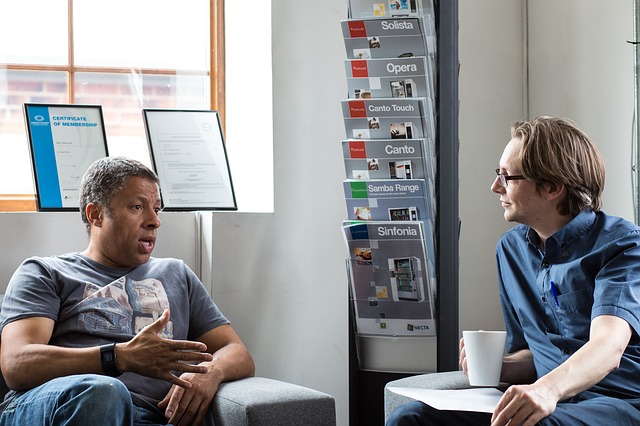Similar to when you change careers in Japan, there are some template questions that are commonly used in job interviews at Japanese companies in Germany.
Your performance during interviews can be improved if you have prepared the answers for such template questions.
Let’s talk about some standard questions you should know before you attend interviews at Japanese companies.
Questions asked during interviews with Japanese companies and the intentions of questions.

The purpose of the interview for the company is to understand and judge the person within a limited time.
You can find some cases where judgment is made through methods other than interviews, such as internships or written examinations. However, generally, companies need to evaluate the applicant’s potential within approximately an hour.
The interviewers will hide their hidden intention in their questions in order to discover the diamond in the rough. Especially, interviewers try to deduce and identify the following 3 elements.
- Can he/she achieve results at work? (Does he/she have the required skills for the position? If not, can he/she learn? And does he/speak/have certain language skills?)
- Is he/she suitable for the company’s culture (would he/she not disturb the atmosphere? Can he/she integrate into the group?)
- Would he/she work in the company for a long time? (would he/she not quit the company after the employer provides the training? Would he/she not refuse the employer’s offer?)
Instead of using direct questions such as: “will you stay in the company for the long term?”, the interviewer tries to find out the applicant’s real intentions through indirect questions such as “Why do you want to live in Germany in the future?”
The following questions are frequently asked during job interviews at Japanese companies in Germany.
- Small talk
- Self-introduction
- Why you came to Germany
- Past work experience and achievements
- Language skill
- Future career plan
- Applying to other companies or not
- Hobbies, chatting
- Questions to the company
I will explain the hidden intentions behind the following questions and provide advice on how to answer them.
Small talk
Generally, interviews start with small talk. The reason why companies don’t start the interviews straightaway is that interviewers want you to perform 100% at the actual interview, by giving you some time to relax and break the ice.

They often ask you questions that are easy to answer, such as; “How did you get here today?” or “Did you get here without getting lost?” You don’t need to be nervous about the small talk.
Self-introduction
The self-introduction will start after approximately 2 to 3 minutes of small talk. Who you are is already described on your CV and interviewers would usually have read it. So, during this part of the interview, you would summarise your experience, background, and who you are.
An important thing to note is that the interviewer is interested in your job experience and academic field if it is related to the position. For example, if you have had a similar role as the position you are applying for during previous volunteer or part-time job experience, it is better to mention them, but you don’t need to explain unrelated experiences.
Usually, you are asked to summarise and talk about your experience in under 2 to 3 minutes.
Why you came to Germany
When you move to Germany and attend an interview you will be asked why you came to Germany and whether you applied to a Japanese or German company.
As mentioned above, the purpose behind doing interviews is to find excellent and skilled people who can work for the company long term. Interviewers thus deduce applicants‘ intentions through this question to be able to find out if they seriously wish to work and live in Germany.
You don’t need to attach too much significance to this question, but you should have a proper answer regarding why you came to Germany and avoid providing vague answers such as “because I like Germany.”
Past work experience and achievements
This question measures your performance, in other words, whether you can achieve goals or not. A difference between interviews at Japanese companies and Western companies could be that you, at Japanese companies, should both showcase your achievements and performances, while simultaneously emphasizing the importance of harmony with colleagues and others.
You should tell the interviewers about what you have achieved and obtained (such as awards and accomplishments) in your previous jobs. You would be asked how you actually achieved these achievements, and how you overcame possible difficulties. The interviewers would like to know if your achievements were coincidences, or whether they can be applicable in a new setting, such as at a new company.
Some Japanese companies may even ask you to do a presentation on the spot.
Language skill

The biggest difference from a career change in Japan is the importance of language skills. Since daily business communication and work requires German and/or English, language skills are highly evaluated.
Your CV has a section about your language skills that shows your language test scores. Interviewers may ask you if you have ever studied abroad or used German and/or English at a job. They may possibly ask you to speak German and English with other German employees.
Future career plan
The question about your future career plan is a touchstone for whether you would stay with the company for a long time.
The important point here is to prevent mismatches between the candidate’s and the company’s respective career plan. For example, some Japanese companies may not offer many promotion opportunities, while, on the other hand, others seek candidates who have a strong desire for such promotion opportunities.
So it is better, to be honest about the career plan that you envision in the future, as evading this question would create disadvantages for both parties.
Applying to other companies or not
Japanese companies don’t want the candidates to choose other companies if they are looking to hire. For this reason, the interviewers would ask you if you are attending other interviews, however, lying that you have not undertaken other interviews may cause trouble.
You should answer honestly if you attend other interviews (you do not need to tell them what companies you have been talking to). By sharing when you get the results or potential offer from the other party/ies you would make things easier for the company in question.
Hobbies, chatting
Sometimes the interviewer asks questions that are not directly connected to the job, such as how you spend time on holidays and your hobbies.
What companies want to understand through these questions is who you are and whether you can integrate into the corporate culture or not. Even if you are in a Japanese company in Germany, there would be some chances to eat with your boss or colleagues, company events, etcetera.

They would like to understand if you can participate in such events and maintain a friendly environment with colleagues, and whether you can relax and enjoy your time off.
Questions to the company
Generally, the last question of the interview is regarding potential questions from you.
It can be viewed as negative if you do not ask the interviewers any questions, it may, for example, come across as if you are not interested in the company. So you should prepare some questions in advance in order to show them that you are interested in their company.

